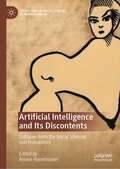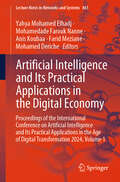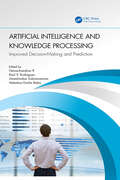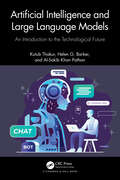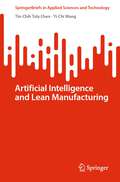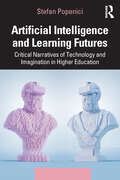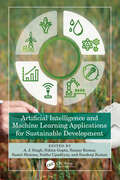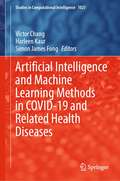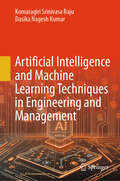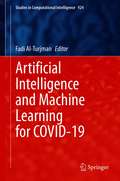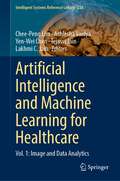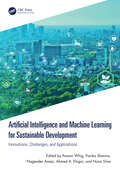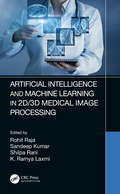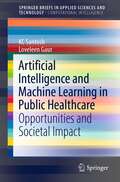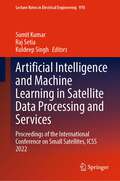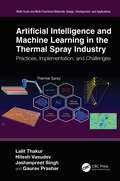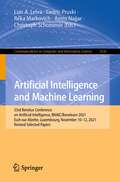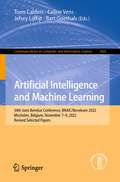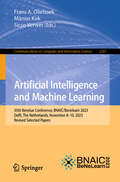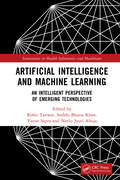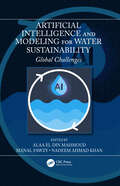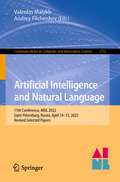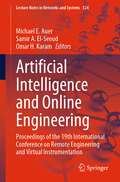- Table View
- List View
Artificial Intelligence and Its Contexts: Security, Business and Governance (Advanced Sciences and Technologies for Security Applications)
by Anna Visvizi Marek BodzianyThis book offers a comprehensive approach to the question of how artificial intelligence (AI) impacts politics, economy, and the society today. In this view, it is quintessential for understanding the complex nature of AI and its role in today’s world. The book has been divided into three parts. Part one is devoted to the question of how AI will be used for security and defense purposes, including combat in war zones. Part two looks at the value added of AI and machine learning for decision-making in the fields of politics and business. Part three consists of case studies—covering the EU, the USA, Saudi Arabia, Portugal, and Poland—that discuss how AI is being used in the realms of politics, security and defense. The discussion in the book opens with the question of the nature of AI, as well as of ethics and the use of AI in combat. Subsequently, the argument covers issues as diverse as the militarization of AI, the use of AI in strategic studies and military strategy design. These topics are followed by an insight into AI and strategic communication (StratCom), including disinformation, as well as into AI and finance. The case-studies included in part 3 of the book offer a captivating overview of how AI is being employed to stimulate growth and development, to promote data- and evidence-driven policy-making, to enable efficient and inclusive digital transformation and other related issues. Written by academics and practitioners in an academically sound, yet approachable manner, this volume queries issues and topics that form the thrust of processes that transform world politics, economics and society. As such, this volume will serve as the primer for students, researchers, lectures and other professionals who seek to understand and engage with the variety of issues AI implicates.
Artificial Intelligence and Its Discontents: Critiques from the Social Sciences and Humanities (Social and Cultural Studies of Robots and AI)
by Ariane HanemaayerOn what basis can we challenge Artificial Intelligence (AI) - its infusion, investment, and implementation across the globe? This book answers this question by drawing on a range of critical approaches from the social sciences and humanities, including posthumanism, ethics and human values, surveillance studies, Black feminism, and other strategies for social and political resistance. The authors analyse timely topics, including bias and language processing, responsibility and machine learning, COVID-19 and AI in health technologies, bio-AI and nanotechnology, digital ethics, AI and the gig economy, representations of AI in literature and culture, and many more. This book is for those who are currently working in the field of AI critique and disruption as well as in AI development and programming. It is also for those who want to learn more about how to doubt, question, challenge, reject, reform and otherwise reprise AI as it been practiced and promoted.
Artificial Intelligence and Its Practical Applications in the Digital Economy: Proceedings of the International Conference on Artificial Intelligence and Its Practical Applications in the Age of Digital Transformation 2024, Volume 1 (Lecture Notes in Networks and Systems #861)
by Anis Koubaa Farid Meziane Yahya Mohamed Elhadj Mohamedade Farouk Nanne Mohamed DericheArtificial Intelligence (AI) technologies hold immense promise for developing countries by offering innovative solutions to longstanding challenges. By leveraging AI in health care, education, economic development, infrastructure, and resource management, these countries can potentially leapfrog traditional development stages and improve the quality of life for their populations. However, it's essential to approach AI deployment with ethical considerations to ensure that the technology serves the best interests of these communities and thus to maximize the expected benefits. The I2COMSAPP'24 "International Conference on Artificial Intelligence and its Applications in the Age of Digital Transformation" aims to provide an excellent opportunity to gather experts, researchers, practitioners, and innovators from various fields to explore the latest advancements, challenges, and practical implementations of artificial intelligence and machine learning (ML) technologies. Moreover, it aims to foster knowledge sharing, collaboration, and networking among professionals who are driving responsible and innovative use of AI and leveraging real-world applications for the betterment of society and industries.
Artificial Intelligence and Its Practical Applications in the Digital Economy: Proceedings of the International Conference on Artificial Intelligence and its Practical Applications in the Age of Digital Transformation 2024, Volume 2 (Lecture Notes in Networks and Systems #862)
by Anis Koubaa Farid Meziane Yahya Mohamed Elhadj Mohamedade Farouk Nanne Mohamed DericheArtificial Intelligence (AI) technologies hold immense promise for developing countries by offering innovative solutions to longstanding challenges. By leveraging AI in health care, education, economic development, infrastructure, and resource management, these countries can potentially leapfrog traditional development stages and improve the quality of life for their populations. However, it's essential to approach AI deployment with ethical considerations to ensure that the technology serves the best interests of these communities and thus to maximize the expected benefits. The I2COMSAPP'24 "International Conference on Artificial Intelligence and its Applications in the Age of Digital Transformation" aims to provide an excellent opportunity to gather experts, researchers, practitioners, and innovators from various fields to explore the latest advancements, challenges, and practical implementations of artificial intelligence and machine learning (ML) technologies. Moreover, it aims to foster knowledge sharing, collaboration, and networking among professionals who are driving responsible and innovative use of AI and leveraging real-world applications for the betterment of society and industries.
Artificial Intelligence and Knowledge Processing: Improved Decision-Making and Prediction
by Valentina Emilia Balas Umashankar Subramaniam Hemachandran K Raul V. RodriguezArtificial Intelligence and Knowledge Processing play a vital role in various automation industries and their functioning in converting traditional industries to AI-based factories. This book acts as a guide and blends the basics of Artificial Intelligence in various domains, which include Machine Learning, Deep Learning, Artificial Neural Networks, and Expert Systems, and extends their application in all sectors. Artificial Intelligence and Knowledge Processing: Improved Decision-Making and Prediction, discusses the designing of new AI algorithms used to convert general applications to AI-based applications. It highlights different Machine Learning and Deep Learning models for various applications used in healthcare and wellness, agriculture, and automobiles. The book offers an overview of the rapidly growing and developing field of AI applications, along with Knowledge of Engineering, and Business Analytics. Real-time case studies are included across several different fields such as Image Processing, Text Mining, Healthcare, Finance, Digital Marketing, and HR Analytics. The book also introduces a statistical background and probabilistic framework to enhance the understanding of continuous distributions. Topics such as Ensemble Models, Deep Learning Models, Artificial Neural Networks, Expert Systems, and Decision-Based Systems round out the offerings of this book. This multi-contributed book is a valuable source for researchers, academics, technologists, industrialists, practitioners, and all those who wish to explore the applications of AI, Knowledge Processing, Deep Learning, and Machine Learning.
Artificial Intelligence and Large Language Models: An Introduction to the Technological Future
by Al-Sakib Khan Pathan Kutub Thakur Helen G. BarkerHaving been catapulted into public discourse in the last few years, this book serves as an in-depth exploration of the ever-evolving domain of artificial intelligence (AI), large language models, and ChatGPT. It provides a meticulous and thorough analysis of AI, ChatGPT technology, and their prospective trajectories given the current trend, in addition to tracing the significant advancements that have materialized over time.Key Features: Discusses the fundamentals of AI for general readers Introduces readers to the ChatGPT chatbot and how it works Covers natural language processing (NLP), the foundational building block of ChatGPT Introduces readers to the deep learning transformer architecture Covers the fundamentals of ChatGPT training for practitioners Illustrated and organized in an accessible manner, this textbook contains particular appeal to students and course convenors at the undergraduate and graduate level, as well as a reference source for general readers.
Artificial Intelligence and Lean Manufacturing (SpringerBriefs in Applied Sciences and Technology)
by Tin-Chih Toly Chen Yi-Chi WangThis book applies artificial intelligence to lean production and shows how to practically combine the advantages of these two disciplines. Lean manufacturing originated in Japan and is a well-known tool for improving manufacturers' competitiveness. Prevalent tools for lean manufacturing include Kanban, Pacemaker, Value Stream Map, 5s, Just-in-Time and Pull Manufacturing. Lean Manufacturing and the Toyota Manufacturing System has been successfully applied to various factories and supply chains around the world. A lean manufacturing system can not only reduce wastes and inventory, but also respond to customer needs more immediately. Artificial intelligence is a subject that has attracted much attention recently. Many researchers and practical developers are working hard to apply artificial intelligence to our daily lives, including in factories. For example, fuzzy rules have been established to optimize machine settings. Bionic algorithms have been proposed to solve production sequencing and scheduling problems. Machine learning technologies are applied to detect possible product quality problems and diagnose the health of a machine. This book will be of interest to production engineers, managers, as well as students and researchers in manufacturing engineering.
Artificial Intelligence and Learning Futures: Critical Narratives of Technology and Imagination in Higher Education
by Stefan PopeniciArtificial Intelligence and Learning Futures: Critical Narratives of Technology and Imagination in Higher Education explores the implications of artificial intelligence’s adoption in higher education and the challenges to building sustainable instead of dystopic schooling. As AI becomes integral to both pedagogy and profitability in today’s colleges and universities, a critical discourse on these systems and algorithms is urgently needed to push back against their potential to enable surveillance, control, and oppression. This book examines the development, risks, and opportunities inherent to AI in education and curriculum design, the problematic ideological assumptions of intelligence and technology, and the evidence base and ethical imagination required to responsibly implement these learning technologies in a way that ensures quality and sustainability. Leaders, administrators, and faculty as well as technologists and designers will find these provocative and accessible ideas profoundly applicable to their research, decision-making, and concerns.
Artificial Intelligence and Machine Learning Applications for Sustainable Development
by A. J. Singh, Nikita Gupta, Sanjay Kumar, Sumit Sharma, Subho Upadhyay, and Sandeep KumarThe book highlights how technologies including artificial intelligence and machine learning are transforming renewable energy technologies and enabling the development of new solutions. It further discusses how smart technologies are employed to optimize energy production and storage, enhance energy efficiency, and improve the overall sustainability of energy systems.This book: Discusses artificial intelligence-based techniques, namely, neural networks, fuzzy expert systems, optimization techniques, and operational research Showcases the importance of artificial intelligence and machine learning in the energy market, demand analysis, and forecasting of renewable energy applications Illustrates strategies for sustainable development using artificial intelligence and machine learning applications Presents applications of artificial intelligence in the domain of electronics transformation and development, smart cities, and renewable energy utilization Highlights the role of artificial intelligence in solving problems such as image and signal processing, smart weather monitoring, smart farming, and distributed energy sources It is primarily written for senior undergraduates, graduate students, and academic researchers in diverse fields, including electrical, electronics and communications, energy, and environmental engineering.
Artificial Intelligence and Machine Learning Methods in COVID-19 and Related Health Diseases (Studies in Computational Intelligence #1023)
by Harleen Kaur Victor Chang Simon James FongThis Springer book provides a perfect platform to submit chapters that discuss the prospective developments and innovative ideas in artificial intelligence and machine learning techniques in the diagnosis of COVID-19. COVID-19 is a huge challenge to humanity and the medical sciences. So far as of today, we have been unable to find a medical solution (Vaccine). However, globally, we are still managing the use of technology for our work, communications, analytics, and predictions with the use of advancement in data science, communication technologies (5G & Internet), and AI. Therefore, we might be able to continue and live safely with the use of research in advancements in data science, AI, machine learning, mobile apps, etc., until we can find a medical solution such as a vaccine. We have selected eleven chapters after the vigorous review process. Each chapter has demonstrated the research contributions and research novelty. Each group of authors must fulfill strict requirements.
Artificial Intelligence and Machine Learning Techniques in Engineering and Management
by Komaragiri Srinivasa Raju Dasika Nagesh KumarThe present book covers various facets of Artificial Intelligence, Machine Learning, and Fuzzy Logic. It includes a brief discussion on performance indicators, Classical and Advanced Machine Learning algorithms, Fuzzy logic-based modelling algorithms, Emerging Research Areas, including Blockchain, recent ML techniques, Evolutionary Algorithms, Large Language Model (LLM)-based Generative AI, the Internet of Things, Big Data, Decision Support Systems, Taguchi design of experiments, data augmentation, and Cross-Validation, and representative case studies. The appendix covers representative AI tools, data sources, books, and journals on AI. The present book can support undergraduate, postgraduate, and Ph.D. students in Artificial Intelligence, Generative Artificial Intelligence, Machine Learning, Data Sciences, Soft Computing, and Fuzzy Logic in Engineering and Management and allied fields. The proposed book has immense value in the interdisciplinary and cross-disciplinary context.
Artificial Intelligence and Machine Learning for COVID-19 (Studies in Computational Intelligence #924)
by Fadi Al-TurjmanThis book is dedicated to addressing the major challenges in fighting COVID-19 using artificial intelligence (AI) and machine learning (ML) – from cost and complexity to availability and accuracy. The aim of this book is to focus on both the design and implementation of AI-based approaches in proposed COVID-19 solutions that are enabled and supported by sensor networks, cloud computing, and 5G and beyond. This book presents research that contributes to the application of ML techniques to the problem of computer communication-assisted diagnosis of COVID-19 and similar diseases. The authors present the latest theoretical developments, real-world applications, and future perspectives on this topic. This book brings together a broad multidisciplinary community, aiming to integrate ideas, theories, models, and techniques from across different disciplines on intelligent solutions/systems, and to inform how cognitive systems in Next Generation Networks (NGN) should be designed, developed, and evaluated while exchanging and processing critical health information. Targeted readers are from varying disciplines who are interested in implementing the smart planet/environments vision via wireless/wired enabling technologies.
Artificial Intelligence and Machine Learning for Healthcare: Vol. 1: Image and Data Analytics (Intelligent Systems Reference Library #228)
by Lakhmi C. Jain Yen-Wei Chen Chee-Peng Lim Ashlesha Vaidya Tejasvi JainArtificial intelligence (AI) and machine learning (ML) have transformed many standard and conventional methods in undertaking health and well-being issues of humans. AL/ML-based systems and tools play a critical role in this digital and big data era to address a variety of medical and healthcare problems, improving treatments and quality of care for patients. This edition on AI and ML for healthcare consists of two volumes. The first presents selected AI and ML studies on medical imaging and healthcare data analytics, while the second unveils emerging methodologies and trends in AI and ML for delivering better medical treatments and healthcare services in the future.In this first volume, progresses in AI and ML technologies for medical image, video, and signal processing as well as health information and data analytics are presented. These selected studies offer readers theoretical and practical knowledge and ideas pertaining to recent advances in AI and ML for effective and efficient image and data analytics, leading to state-of-the-art AI and ML technologies for advancing the healthcare sector.
Artificial Intelligence and Machine Learning for Sustainable Development: Innovations, Challenges, and Applications
by Ahmed A. Elngar Pawan Whig Nuno Silva Nagender Aneja Pavika SharmaArtificial Intelligence and Machine Learning for Sustainable Development is a comprehensive exploration of how artificial intelligence (AI) and machine learning (ML) technologies are revolutionizing the field of sustainable development.The book examines cutting-edge innovations, practical applications, and potential challenges in harnessing AI and ML to address global sustainability issues. It offers insights into how these technologies can optimize resource management, improve environmental monitoring, enhance decision-making processes, and promote equitable, eco-friendly solutions. This book would be of special interest to researchers, policymakers, and practitioners seeking to leverage cutting-edge technology for a more sustainable future.
Artificial Intelligence and Machine Learning in 2D/3D Medical Image Processing
by Sandeep Kumar Rohit Raja Shilpa Rani K. Ramya LaxmiDigital images have several benefits, such as faster and inexpensive processing cost, easy storage and communication, immediate quality assessment, multiple copying while preserving quality, swift and economical reproduction, and adaptable manipulation. Digital medical images play a vital role in everyday life. Medical imaging is the process of producing visible images of inner structures of the body for scientific and medical study and treatment as well as a view of the function of interior tissues. This process pursues disorder identification and management. Medical imaging in 2D and 3D includes many techniques and operations such as image gaining, storage, presentation, and communication. The 2D and 3D images can be processed in multiple dimensions. Depending on the requirement of a specific problem, one must identify various features of 2D or 3D images while applying suitable algorithms. These image processing techniques began in the 1960s and were used in such fields as space, clinical purposes, the arts, and television image improvement. In the 1970s, with the development of computer systems, the cost of image processing was reduced and processes became faster. In the 2000s, image processing became quicker, inexpensive, and simpler. In the 2020s, image processing has become a more accurate, more efficient, and self-learning technology. This book highlights the framework of the robust and novel methods for medical image processing techniques in 2D and 3D. The chapters explore existing and emerging image challenges and opportunities in the medical field using various medical image processing techniques. The book discusses real-time applications for artificial intelligence and machine learning in medical image processing. The authors also discuss implementation strategies and future research directions for the design and application requirements of these systems. This book will benefit researchers in the medical image processing field as well as those looking to promote the mutual understanding of researchers within different disciplines that incorporate AI and machine learning. FEATURES Highlights the framework of robust and novel methods for medical image processing techniques Discusses implementation strategies and future research directions for the design and application requirements of medical imaging Examines real-time application needs Explores existing and emerging image challenges and opportunities in the medical field
Artificial Intelligence and Machine Learning in Public Healthcare: Opportunities and Societal Impact (SpringerBriefs in Applied Sciences and Technology)
by Loveleen Gaur KC SantoshThis book discusses and evaluates AI and machine learning (ML) algorithms in dealing with challenges that are primarily related to public health. It also helps find ways in which we can measure possible consequences and societal impacts by taking the following factors into account: open public health issues and common AI solutions (with multiple case studies, such as TB and SARS: COVID-19), AI in sustainable health care, AI in precision medicine and data privacy issues. Public health requires special attention as it drives economy and education system. COVID-19 is an example—a truly infectious disease outbreak. The vision of WHO is to create public health services that can deal with abovementioned crucial challenges by focusing on the following elements: health protection, disease prevention and health promotion. For these issues, in the big data analytics era, AI and ML tools/techniques have potential to improve public health (e.g., existing healthcare solutions and wellness services). In other words, they have proved to be valuable tools not only to analyze/diagnose pathology but also to accelerate decision-making procedure especially when we consider resource-constrained regions.
Artificial Intelligence and Machine Learning in Satellite Data Processing and Services: Proceedings of the International Conference on Small Satellites, ICSS 2022 (Lecture Notes in Electrical Engineering #970)
by Sumit Kumar Kuldeep Singh Raj SetiaThis book, Artificial Intelligence and Machine Learning in Satellite: Data Processing and Services, presents the selected proceedings of the International Conference on Small Satellites (ICSS 2022) that aims to provide an opportunity for academicians, scientists, researchers, and industry experts, engaged in teaching, research, and development on satellite data processing and its services by employing advanced artificial intelligence-based machine learning techniques. This book covers the application of artificial intelligence and machine learning techniques in various domains of earth observations like natural resources and environmental management, water resources, urban and rural development, climate change, and other contemporary subjects. The book will surely be a valuable asset for beginners, researchers, and professionals working in satellite data processing and services using artificial intelligence and machine learning approaches.
Artificial Intelligence and Machine Learning in the Thermal Spray Industry: Practices, Implementation, and Challenges (Multi-Scale and Multi-Functional Materials)
by Lalit Thakur Hitesh Vasudev Jashanpreet Singh Gaurav PrasharThis book details the emerging area of the induction of expert systems in thermal spray technology, replacing traditional parametric optimization methods like numerical modeling and simulation. It promotes, enlightens, and hastens the digital transformation of the surface engineering industry by discussing the contribution of expert systems like Machine Learning (ML) and Artificial Intelligence (AI) toward achieving durable Thermal Spray (TS) coatings. Artificial Intelligence and Machine Learning in the Thermal Spray Industry: Practices, Implementation, and Challenges highlights how AI and ML techniques are used in the TS industry. It sheds light on AI’s versatility, revealing its applicability in solving problems related to conventional simulation and numeric modeling techniques. This book combines automated technologies with expert machines to show several advantages, including decreased error and greater accuracy in judgment, and prediction, enhanced efficiency, reduced time consumption, and lower costs. Specific barriers preventing AI’s successful implementation in the TS industry are also discussed. This book also looks at how training and validating more models with microstructural features of deposited coating will be the center point to grooming this technology in the future. Lastly, this book thoroughly analyzes the digital technologies available for modeling and achieving high-performance coatings, including giving AI-related models like Artificial Neural Networks (ANN) and Convolutional Neural Networks (CNN) more attention. This reference book is directed toward professors, students, practitioners, and researchers of higher education institutions working in the fields that deal with the application of AI and ML technology.
Artificial Intelligence and Machine Learning: 33rd Benelux Conference on Artificial Intelligence, BNAIC/Benelearn 2021, Esch-sur-Alzette, Luxembourg, November 10–12, 2021, Revised Selected Papers (Communications in Computer and Information Science #1530)
by Cédric Pruski Amro Najjar Luis A. Leiva Réka Markovich Christoph SchommerThis book contains a selection of the best papers of the 33rd Benelux Conference on Artificial Intelligence, BNAIC/ BENELEARN 2021, held in Esch-sur-Alzette, Luxembourg, in November 2021. The 14 papers presented in this volume were carefully reviewed and selected from 46 regular submissions. They address various aspects of artificial intelligence such as natural language processing, agent technology, game theory, problem solving, machine learning, human-agent interaction, AI and education, and data analysis.
Artificial Intelligence and Machine Learning: 34th Joint Benelux Conference, BNAIC/Benelearn 2022, Mechelen, Belgium, November 7–9, 2022, Revised Selected Papers (Communications in Computer and Information Science #1805)
by Toon Calders Celine Vens Bart Goethals Jefrey LijffijtThis book contains a selection of the best papers of the 34th Benelux Conference on Artificial Intelligence, BNAIC/ BENELEARN 2022, held in Mechelen, Belgium, in November 2022.The 11 papers presented in this volume were carefully reviewed and selected from 134 regular submissions. They address various aspects of artificial intelligence such as natural language processing, agent technology, game theory, problem solving, machine learning, human-agent interaction, AI and education, and data analysis.
Artificial Intelligence and Machine Learning: 35th Benelux Conference, BNAIC/Benelearn 2023, Delft, The Netherlands, November 8–10, 2023, Revised Selected Papers (Communications in Computer and Information Science #2187)
by Frans A. Oliehoek Manon Kok Sicco VerwerThis book constitutes the refereed proceedings of the 35th Benelux Conference on Artificial Intelligence and Machine Learning, BNAIC/Benelearn 2023, held in Delft, The Netherlands, during November 8–10, 2023. The 14 papers included in these proceedings were carefully reviewed and selected from 47 submissions. These papers focus on various aspects of Artificial Intelligence and Machine learning, including Natural Language Processing and Reinforcement Learning, and their applications.
Artificial Intelligence and Machine Learning: An Intelligent Perspective of Emerging Technologies (Innovations in Health Informatics and Healthcare)
by Rohit Tanwar Varun Sapra Surbhi Bhatia Khan Neelu Jyoti AhujaThis book focuses on artificial intelligence (AI) and machine learning (ML) technologies and how they are progressively being incorporated into a wide range of products, including consumer gadgets, "smart" personal assistants, cutting-edge medical diagnostic systems, and quantum computing systems. This concise reference book offers a broad overview of the most important trends and discusses how these trends and technologies are being created and employed in the applications in which they are being used. Artificial Intelligence and Machine Learning: An Intelligent Perspective of Emerging Technologies offers a broad package involving the incubation of AI and ML with various emerging technologies such as Internet of Things (IoT), healthcare, smart cities, robotics, and more. The book discusses various data collection and data transformation techniques and also maps the legal and ethical issues of data-driven e-healthcare systems while covering possible ways to resolve them. The book explores different techniques on how AI can be used to create better virtual reality experiences and deals with the techniques and possible ways to merge the power of AI and IoT to create smart home appliances. With contributions from experts in the field, this reference book is useful to healthcare professionals, researchers, and students of industrial engineering, systems engineering, biomedical, computer science, electronics, and communications engineering.
Artificial Intelligence and Modeling for Water Sustainability: Global Challenges
by Alaa El Din Mahmoud Manal Fawzy Nadeem Ahmad KhanArtificial intelligence and the use of computational methods to extract information from data are providing adequate tools to monitor and predict water pollutants and water quality issues faster and more accurately. Smart sensors and machine learning models help detect and monitor dispersion and leakage of pollutants before they reach groundwater. With contributions from experts in academia and industries, who give a unified treatment of AI methods and their applications in water science, this book help governments, industries, and homeowners not only address water pollution problems more quickly and efficiently, but also gain better insight into the implementation of more effective remedial measures. FEATURES Provides cutting-edge AI applications in water sector. Highlights the environmental models used by experts in different countries. Discusses various types of models using AI and its tools for achieving sustainable development in water and groundwater. Includes case studies and recent research directions for environmental issues in water sector. Addresses future aspects and innovation in AI field related to watersustainability. This book will appeal to scientists, researchers, and undergraduate and graduate students majoring in environmental or computer science and industry professionals in water science and engineering, environmental management, and governmental sectors. It showcases artificial intelligence applications in detecting environmental issues, with an emphasis on the mitigation and conservation of water and underground resources.
Artificial Intelligence and Natural Language: 11th Conference, AINL 2022, Saint Petersburg, Russia, April 14–15, 2022, Revised Selected Papers (Communications in Computer and Information Science #1731)
by Andrey Filchenkov Valentin MalykhThis book constitutes the refereed proceedings of the 11th Conference on Artificial Intelligence and Natural Language, AINL 2022, held in St. Petersburg, Russia, in April 2022. The 8 revised full papers and 1 short paper were carefully reviewed and selected from 20 submissions. The volume presents recent research in areas of of text mining, speech technologies, dialogue systems, information retrieval, machine learning, articial intelligence, and robotics.
Artificial Intelligence and Online Engineering: Proceedings of the 19th International Conference on Remote Engineering and Virtual Instrumentation (Lecture Notes in Networks and Systems #524)
by Michael E. Auer Samir A. El-Seoud Omar H. KaramNowadays, online technologies are the core of most fields of engineering and the whole society and are inseparable connected for example with Internet of Things & Industrial Internet of Things (Industry 4.0), Online & Biomedical Engineering, Data Science, Machine Learning, and Artificial Intelligence, Cross & Mixed Reality, and Remote Working Environments. to name only a few. Since the first REV conference in 2004, we tried to focus on the upcoming use of the Internet for engineering tasks and the opportunities as well as challenges around it. Consequently, the motto of this year’s REV2022 was “Artificial Intelligence and Online Engineering”. In a globally connected world, the interest in online collaboration, teleworking, remote services, and other digital working environments is rapidly increasing. In response to that, the general objective of this conference is to contribute and discuss fundamentals, applications, and experiences in the field of Online and Remote Engineering, Virtual Instrumentation and other related new technologies like Cross Reality, Data Science & Big Data, Internet of Things & Industrial Internet of Things, Industry 4.0, Cyber-Security, and M2M & Smart Objects. Another objective of the conference is to discuss guidelines and new concepts for engineering education in higher and vocational education institutions, including emerging technologies in learning, MOOCs & MOOLs, and Open Resources. REV2022 was the 19th in a series of annual events concerning the area of Online Engineering. It has been organized in cooperation with The British University in Egypt (BUE), Cairo, as a hybrid event from February 28 until March 02, 2022.

